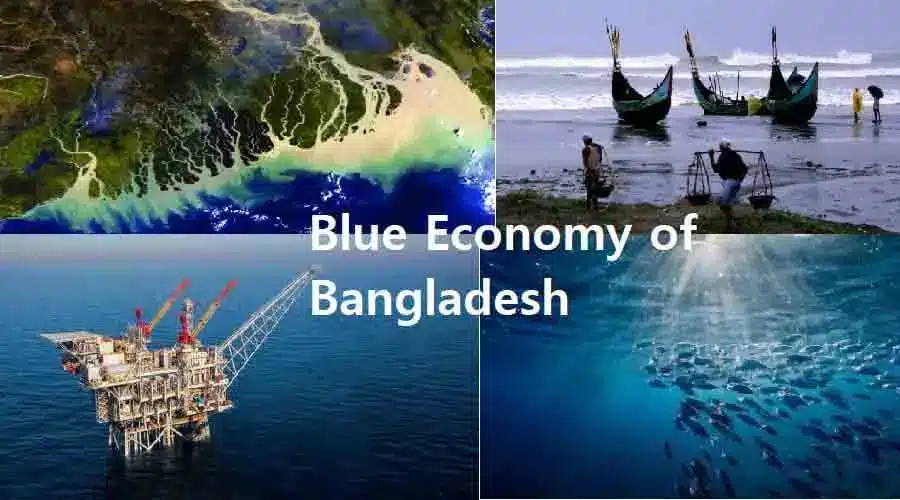 Md Hasanur Rahman Tanzir :: Economy more precisely “ocean-based economies” is considered a beneficial sector in Bangladesh which refers to the proper utilization of oceanic resources for sustainable economic growth of a region or country.
Md Hasanur Rahman Tanzir :: Economy more precisely “ocean-based economies” is considered a beneficial sector in Bangladesh which refers to the proper utilization of oceanic resources for sustainable economic growth of a region or country.
It covers economic activities such as fishing, aquaculture, and tourism that depend on healthy oceans and seas but also includes new industries like biotechnology and maritime transport. Blue Economy has also opened a new window of opportunities including commerce and trade, tourism, pharmaceuticals, use of deep-sea ports, foreign trade, and so forth.
The main objective of the blue economy is to make the appropriate use of marine assets containing all economic exercises that are related to seas, ports, coastal zones, and other ocean-based exercises to entirely reduce ecological hazards and enhance human prosperity. A blue economy roadmap is necessary to provide a comprehensive strategy for ocean-based sustainable development that brings together the economy, environment, and society closely linked to the UN 2030 Sustainable Development Goals (SDGs). The blue economy is the use of ocean resources in a sustainable way. Life originated in the oceans and they continue to support all life today by generating oxygen, absorbing carbon dioxide, recycling nutrients, and regulating global climate and temperature. Oceans provide a substantial portion of the global population with food and livelihoods and are the means of transport for 80% of global trade.
Enormous potential Opportunities for Blue Economy in Bangladesh: The coastal areas and the Bay of Bengal are the heart of the blue economy in Bangladesh. Most of the oceans economic activities including marine fishing, tourism, and research based on the Bay of Bengal consequently change the livelihoods and social status of millions of people inhabiting the coastal areas. Several sectors of the blue economy offer potential for development to achieve food security and economic development objectives. The potential highlighted sectors for the development of ocean economics in Bangladesh include Fisheries, Marine Biotechnology, marine tourism, marine commerce, shipping and navigations, salt production, oil and gas mining, bio-fuelling, and extraction of ocean energy. It has been observed that different economic sectors contributed to the blue economy of Bangladesh as following
Aquaculture: Global food security is very closely related to the sustainable use of marine biodiversity particularly to the exploitation of wild fisheries. One billion people in developing countries depend on seafood as their primary source of protein. The most important areas of the national economy of Bangladesh are the Bay of Bengal and adjacent coastal areas which are enriched with very wide ranges of diverse flora and fauna including fishes, shrimps, molluscs, crabs, mammals, seaweeds, etc. The current total fish production is 3.68 million tons, contributing to 3.69% of GDP. The capture fishery contributes to 1.0 million tons (28%), aquaculture 2.2 million tons (56%), and marine fisheries 0.6 million tons (16%) of total fish production (Shamsuzzaman et al., 2020). The single fish species, Tenualosa ilisha, accounts for nearly about 42% of total marine catches and 10.5% of the total fish production of the country (Asaduzzaman et al., 2020).
Oil, gas, and minerals mining : Within the maritime domain of Bangladesh, there can be several rich oil and gas reserves such as India and Myanmar sites, which must be explored and exploited. Bangladesh has yet to assess the complete potential of its offshore oil and gas prospects. Some 26 Tcf (trillion cubic feet) gas reserve has to this point been found in Bangladesh, of which only about 1 Tcf is found within the offshore areas (MoFA, 2020). In the meantime, Bangladesh drilled 20 wells within the offshore locations of the BoB but just two gas reserves (Sangu and also Kutubdia) were found (Hossain et al., 2014).
Challenges to the Blue Economy in Bangladesh: Blue Injustice Similar to all jurisdictions, The Bahamas is far from achieving perfect governance, and blue growth may generate or exacerbate pre-existing injustices. (1) dispossession, displacement, and ocean grabbing; (2) environmental justice concerns from pollution and waste; (3) environmental degradation and reduction of ecosystem services; (4) livelihood impacts for small-scale fishers; (5) lost access to marine resources needed for food security and wellbeing; (6) inequitable distribution of economic benefits; (7) social and cultural impacts; (8) marginalization of women; (9) human and Indigenous rights abuses; and (10) exclusion from governance.
Bangladesh must take some steps for the far-reaching development of the blue economy. Supplying reliable data and accurate statistics is necessary so that investors can be attracted to this sector and contribute to its development. The government should formulate short-term, medium-term, and long-term plans for the Blue Economy, relying on technology and skilled manpower. Besides, ensuring scientific research, eco-friendly collection, and sustainable use of fish and undiscovered marine resources is also necessary. So far, 26 sectors have been identified for maritime trade including oil and gas, tourism, ports, shipping, renewable energy (wind and currents), and marine resources and mineral-based industries. There is a need to assess the feasibility of these sectors and plan how to proceed or which one to prioritize.



